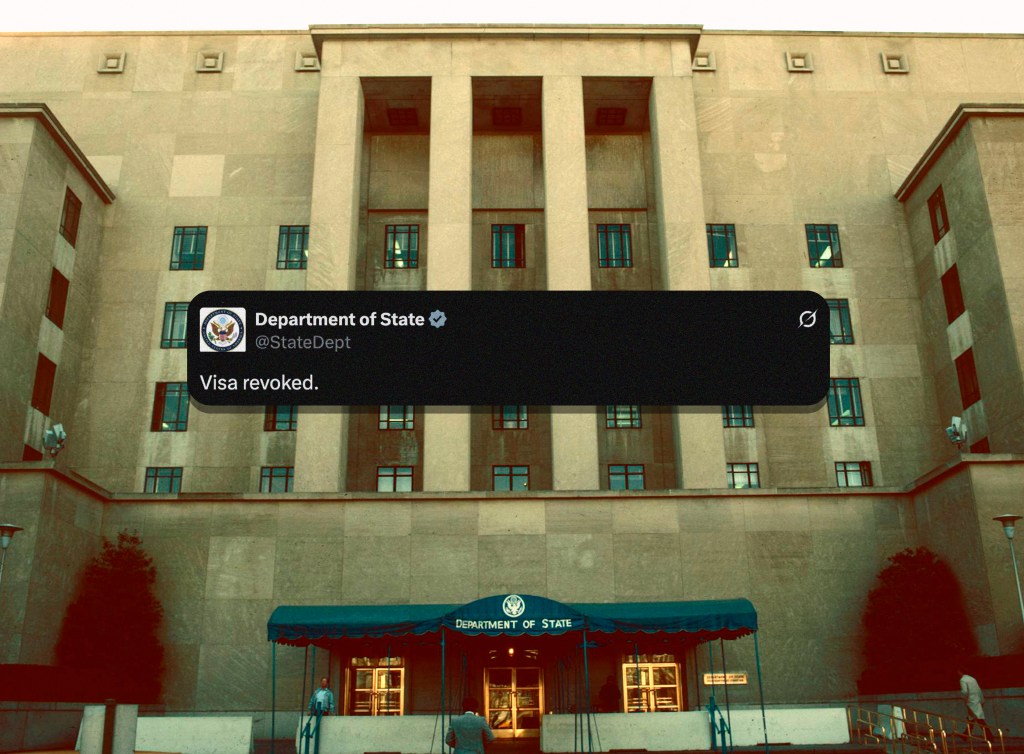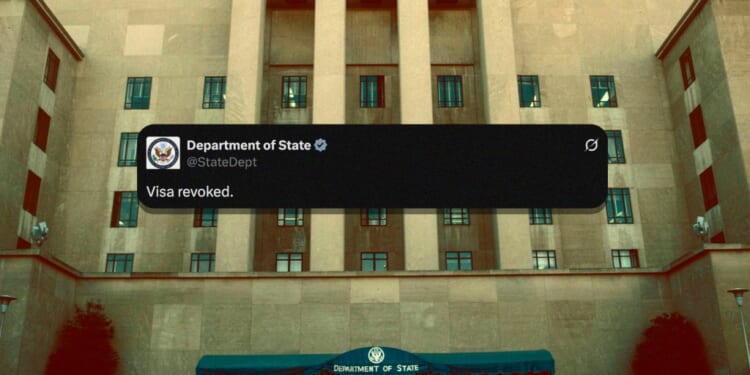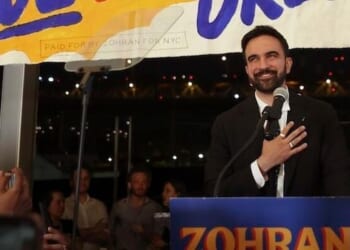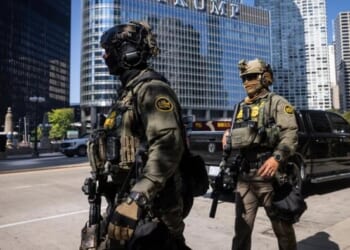
When State Department officials revoked the visas of at least six foreign nationals last week, they did so with the social-media bluster typical of Donald Trump’s second administration. “The United States has no obligation to host foreigners who wish death on Americans,” read a post on X from the department’s official account. “The State Department continues to identify visa holders who celebrated the heinous assassination of Charlie Kirk.”
A thread featuring the statements of each of the six offenders followed, with either a screenshot of a social media post or an unsourced quotation from an unnamed foreign national. The messages were of varying levels of repugnance, stating that Kirk, the well-connected conservative activist who was murdered last month, deserved to die or had it coming. Each post in the thread ended with the same comment: “Visa revoked.”
Meanwhile, one State Department employee bragged about his contribution to this micropurge on his personal Facebook page. “I love my Job,” Joe Rittenhouse wrote last week in a post with attached screenshots from the State Department’s thread on X. Then he repeated the mantra: “Visa Revoked.”
Rittenhouse’s job is, officially, special adviser to the Bureau of Consular Affairs, a division of the State Department generally occupied by the mundane administrative tasks such as assisting U.S. citizens traveling abroad and issuing passports. But the bureau’s office for visa services has become a more visible part of President Trump’s intense immigration enforcement agenda. And according to his own social media posts, Rittenhouse—a former actor, non-lawyer, and Republican activist from Pennsylvania with no prior experience in government or the foreign service—is at the center of it all.
In the comments to his initial Facebook post, screenshots of which I have obtained from a person who is “friends” with him on the platform, Rittenhouse revealed his deep involvement with the decisionmaking on the revocations and defended the choices of the State Department. He also claimed to have successfully argued against revoking the visas of many more noncitizens whose offensive speech did not apparently rise to the level of deportable.
“Thousands of revokations [sic] were rejected because I didn’t think it warranted action,” Rittenhouse said in response to one commenter who criticized the State Department’s move. “I stand by this 100%.”
In another comment, Rittenhouse claimed there had been “extensive” legal reviews of each revocation. “I followed the law as is,” he wrote. “I was the only person in the room who defended atrocious and hateful things that would absolutely cost anyone thier [sic] job.”
Rittenhouse noted that part of the standard visa application requires applicants to state they do not “support or celebrate political violence and terrorism” and that the statements that prompted revocations run counter to that promise. In a third comment, Rittenhouse said that while he doesn’t agree with the concept of “hate speech,” the revocations are justified if the speech indicates a visaholder was dishonest. “My only contention is that if we ask you in an interview if you support terrorism and political assassination and you mark down no. [sic] And say no and then you go out and post these things you clearly lied to us,” he posted.
(It’s worth noting here that in the security background section of the standard application’s questionnaire, there are no questions about whether an applicant “supports or celebrates” political violence or assassinations, and asks only if the applicant intends to engage in or has financially or otherwise supported terrorism.)
I asked the State Department, which has not commented any further publicly on the revocations, about these latest revocations and whether Rittenhouse’s private social media comments reflected the department’s actual legal justification. I also asked for further comment from Rittenhouse on the content of his Facebook posts or his role in determining visa revocations. In response, I received a statement from State Department spokesman Tommy Pigott: “The Department has well established processes for denying and rescinding visas based on derogatory information. There is no free pass just because an individual chose to post that information online. As Secretary Rubio made clear, guests in our country who celebrated the political assassination of Charlie Kirk will have their visas revoked.”
The question of legal justification is important, as established legal precedent dictates that noncitizens who are in the United States lawfully are entitled to due process in deportation proceedings. The 1945 Supreme Court decision in Bridges v. Wixon found that an Australian legal resident had been denied Fifth Amendment and 14th Amendment due process protections after he had been accused of being a member of the Communist Party and was ordered to be deported. But a concurrence from Justice Frank Murphy went a step further in arguing that legal aliens also deserved First Amendment protections.
Subsequent case law has clarified that foreigners seeking to enter the United States do not necessarily have full free speech protections afforded to citizens and reaffirmed that the executive branch has significant plenary power regarding immigration. But the Trump administration is aggressively testing the limits and gaps of the case law and statutory law, and those tests are already being litigated. For months, the administration has been revoking visas, primarily for students, over everything from past DUIs to pro-Palestinian speech.
Earlier this year a coalition of free speech organizations sued the federal government on behalf of noncitizen students who had been detained by Immigration and Customs Enforcement over speech that was either critical of Israel and the United States or expressed support for Palestinians. Last month, the federal judge in Massachusetts presiding over the case issued a scathing ruling against the Trump administration, stating that the government had used the threat of deportation to quash free speech on campus.
And in August, the student newspaper at Stanford University sued the government for declaratory and injunctive relief against deportation of noncitizen students for their speech. The complaint was filed by attorneys with the pro-free speech advocacy group Foundation for Individual Rights and Expression and claims that the student journalists at the Stanford Daily newspaper are unable to use their First Amendment rights to report on or express opinions out of fear of reprisal by the federal government. Two of the unnamed plaintiffs are legal noncitizen students who have refrained from expressing their views.
Conor Fitzpatrick, who is FIRE’s lead litigator in the Stanford Daily case, told me nobody should be surprised that the federal government is going after legal noncitizens over supposed speech violations. “I think part of it comes from the top. President Trump made the promise on the campaign trail … that he was going to revoke the visas of people that he thought were too sympathetic to Hamas, as he put it, which usually just means pro-Palestinian speech,” Fitzpatrick said. “They’ve been calling their shot, for lack of a better word, since before Donald Trump even came in office.”
Even if there were some foreign policy-related justification for deporting noncitizens who spoke out on behalf of adversaries of American allies, such as Hamas, it’s impossible to see how mocking Kirk’s death, however abhorrent, is grounds for violating a legal noncitizen’s First Amendment rights.
“When you start getting into stuff like Charlie Kirk, where it’s revoking visas because they’re celebrating someone’s death, there’s no statutory analog to that,” Fitzpatrick told me.
That doesn’t appear to be what Rittenhouse thinks, however. On his public X profile (which, similar to his Facebook profile, features a photograph of him with a sombrero and comically large mustache digitally added), he replied last week to someone who had found a university professor who had tweeted something unkind about Kirk after his assassination. “I see you’re looking to identify visa holders?” wrote the anonymous X user in a message addressed to Secretary of State Marco Rubio. “She’s a professor at Syracuse. This is only ONE of her many ghoulish tweets.”
“On it,” Rittenhouse replied.
















